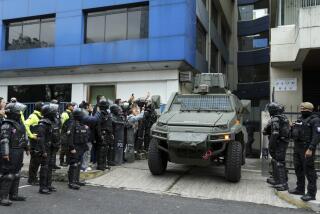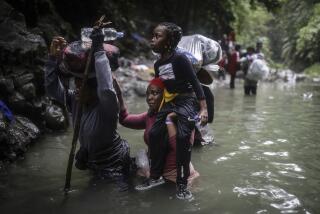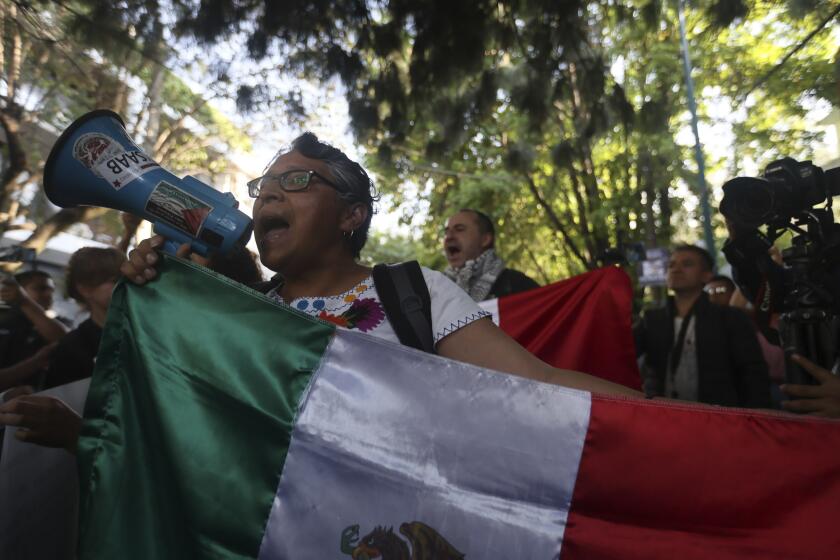Colombia suspends talks, seeks help as it hunts for kidnapped general
Colombia’s defense minister headed to a remote northwestern state Monday to direct search and rescue operations for an army general whose kidnapping over the weekend by suspected rebels prompted the government to suspend peace talks with the insurgent group.
Gen. Ruben Dario Alzate, the commander of an army task force in Choco state, was seized along with an army lieutenant and a civilian lawyer in a village Sunday afternoon about 10 miles from the state capital, Quibdo.
The three had traveled to the village by boat to inspect an energy project. Alzate was reportedly dressed in civilian clothing and was without his customary security detail.
No group immediately claimed responsibility for the kidnapping. However, in brief remarks late Sunday night, President Juan Manuel Santos said the government had solid information that the captors were members of the Revolutionary Armed Forces of Colombia, or FARC, the rebel group with which the government has been in peace talks since November 2012.
Santos also said Sunday that in the wake of the kidnappings he had ordered a suspension of the talks, which were scheduled to resume this week in Havana. He said he had told the government negotiating team, led by Humberto de la Calle, to call off its trip to Cuba.
“This is totally unacceptable,” Santos said. “We are suspending negotiations until the situation is clarified and they are released.”
In a speech to the nation Monday night, Santos reiterated his demand that the hostages be released and said he had asked Cuba and Venezuela, which have facilitated the peace talks, to assist in resolving the crisis.
“I demand that the FARC ... show its will for peace with actions, not just words,” he said.
Defense Minister Juan Carlos Pinzon was dispatched to head the search for the kidnapping victims.
The abduction and suspension of talks come after an upsurge in violence in recent weeks against civilians and the armed forces, allegedly perpetrated by the FARC. Rebels are blamed for killing two unarmed civilian members of an indigenous community in southwestern Cauca state this month after the two had pulled down a pro-FARC banner on their reservation.
In two other incidents, rebels are believed to have killed three members of the armed services and kidnapped two others. Although the two sides have agreed on three of five broad negotiating topics in Havana, no cease-fire has been declared.
Last week, with the approach of the Nov. 15 two-year anniversary of the start of the talks, De la Calle warned the FARC that the government’s patience was wearing thin and that faster progress was needed on remaining issues. Also last week, Santos warned that he might call off the talks altogether if violence continued.
There was no immediate response from FARC negotiators to the kidnappings and suspension. Communication between the rebel high command and their rank and file is known to be tenuous because of government success in attacking insurgents using cellphone and radio signals.
In an apparent bid to strengthen its bargaining position with a show of strength, the FARC has also been blamed for an uptick this year in attacks on oil pipelines and power lines.
The increased violence has hardened many Colombians’ attitudes toward the FARC. Some critics, led by Alvaro Uribe, a former president who is now a member of the Senate, insist that the only way to achieve peace is on the battlefield.
The peace talks have bogged down in recent months over the issue of victims’ rights and reparations. An estimated 220,000 Colombians have been killed, kidnapped and disappeared since the mid-1960s at the hands of armed groups, including rebels, armed forces, paramilitary groups and criminal gangs. The conflict is the hemisphere’s longest-running war.
The victims will probably be entitled to billions of dollars in reparations, a financial burden that is likely to be shouldered mostly by the government. Millions of acres in land appropriated by armed groups will be returned to the poor farmers and peasants from which it was stolen. University of Miami professor Bruce Bagley estimates the cost of the reparations could total $45 billion.
Kraul is a special correspondent.
More to Read
Start your day right
Sign up for Essential California for news, features and recommendations from the L.A. Times and beyond in your inbox six days a week.
You may occasionally receive promotional content from the Los Angeles Times.






